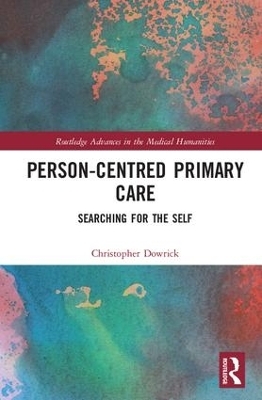
Person-centred Primary Care
Searching for the Self
Seiten
2017
Routledge (Verlag)
978-1-138-24418-4 (ISBN)
Routledge (Verlag)
978-1-138-24418-4 (ISBN)
Primary care, grounded in the provision of continuous comprehensive person-centred care, is vital to the delivery of effective health care. The central notion of person-centred care, however, relies on often-unexamined concepts of self. This book explores contemporary pressures on the sense of self for both patient and health professional
Primary care, grounded in the provision of continuous comprehensive person-centred care, is of paramount importance in the delivery of accessible and effective health care around the world. The central notion of person-centred care, however, relies on often-unexamined concepts of self, or understandings of what it means to be a person and an agent. This cutting-edge book explores contemporary pressures on the sense of self for both patient and health professional within a consultation and argues that building new concepts of the self is essential if we are to reinvigorate the central tenets of person-centred primary care.
Contemporary trends such as shared decision-making between health professionals and patients and promoting self-management assume those involved are able to make their own decisions and take action. In practice, however, medicine often opts for reductionist perspectives of patients as passive mechanical systems and diseases as puzzles. At the same time, huge political and organisational changes mean time and resources are scarce, putting further pressure on consultations. This book discusses how we can start to resolve these tensions. The first part considers problems posed by the increasing bureaucratisation of primary care, the impact of information technology in the consultation, the effects of chronic disease on our sense of self and how an emphasis on biology over biography leads to over-diagnosis. The second part proposes solutions based on a strong ontology of consciousness, concepts of creative capacity, coherence and engagement, and will show how these can enhance the self-esteem of patients and doctors and benefit their therapeutic dialogue.
Combining theoretical perspectives from philosophy, sociology and healthcare research with insights drawn from clinical practice, this edited volume is suitable for those researching and studying primary healthcare, communication and relationships in healthcare and the medical humanities.
Primary care, grounded in the provision of continuous comprehensive person-centred care, is of paramount importance in the delivery of accessible and effective health care around the world. The central notion of person-centred care, however, relies on often-unexamined concepts of self, or understandings of what it means to be a person and an agent. This cutting-edge book explores contemporary pressures on the sense of self for both patient and health professional within a consultation and argues that building new concepts of the self is essential if we are to reinvigorate the central tenets of person-centred primary care.
Contemporary trends such as shared decision-making between health professionals and patients and promoting self-management assume those involved are able to make their own decisions and take action. In practice, however, medicine often opts for reductionist perspectives of patients as passive mechanical systems and diseases as puzzles. At the same time, huge political and organisational changes mean time and resources are scarce, putting further pressure on consultations. This book discusses how we can start to resolve these tensions. The first part considers problems posed by the increasing bureaucratisation of primary care, the impact of information technology in the consultation, the effects of chronic disease on our sense of self and how an emphasis on biology over biography leads to over-diagnosis. The second part proposes solutions based on a strong ontology of consciousness, concepts of creative capacity, coherence and engagement, and will show how these can enhance the self-esteem of patients and doctors and benefit their therapeutic dialogue.
Combining theoretical perspectives from philosophy, sociology and healthcare research with insights drawn from clinical practice, this edited volume is suitable for those researching and studying primary healthcare, communication and relationships in healthcare and the medical humanities.
Christopher Dowrick is Professor of Primary Medical Care at the University of Liverpool, UK.
1 Recovering general practice from epistemic disadvantage
Sally Hull with George Hull
2 Mismanagement in general practice
Stefan Hjörleifsson and Kjersti Lea
3 Challenges to the ‘self ’ in IT-mediated health care
Deborah Swinglehurst
4 Subjectivity of patients and doctors
Iona Heath
5 In defence of the conscious mind 9
David Misselbrook
6 Patient, person, self
Christopher Dowrick
7 Unlocking the creative capacity of the self
Joanne Reeve
Epilogue
Christopher Dowrick
| Erscheinungsdatum | 28.01.2018 |
|---|---|
| Reihe/Serie | Routledge Advances in the Medical Humanities |
| Zusatzinfo | 3 Tables, black and white; 4 Line drawings, black and white |
| Verlagsort | London |
| Sprache | englisch |
| Maße | 156 x 234 mm |
| Gewicht | 453 g |
| Themenwelt | Sachbuch/Ratgeber ► Gesundheit / Leben / Psychologie |
| Geisteswissenschaften ► Philosophie | |
| Studium ► 1. Studienabschnitt (Vorklinik) ► Med. Psychologie / Soziologie | |
| Studium ► Querschnittsbereiche ► Prävention / Gesundheitsförderung | |
| ISBN-10 | 1-138-24418-X / 113824418X |
| ISBN-13 | 978-1-138-24418-4 / 9781138244184 |
| Zustand | Neuware |
| Informationen gemäß Produktsicherheitsverordnung (GPSR) | |
| Haben Sie eine Frage zum Produkt? |
Mehr entdecken
aus dem Bereich
aus dem Bereich


